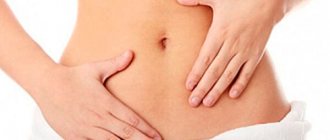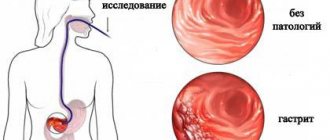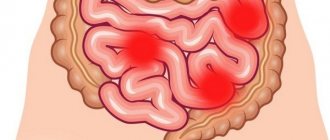Belching rotten eggs with constant indigestion
The appearance of belching with an unpleasant smell of rotten eggs in combination with constant diarrhea can occur for the following reasons:
- the development of gastritis due to poor nutrition and excessive consumption of harmful foods with the successful reproduction of Helicobacter pylori on the walls of the gastric mucosa;
- inflammation of the pancreas (pancreatitis) after severe trauma to the abdominal cavity, poor diet, excessive consumption of alcohol, long-term use of certain types of drugs, the development of oncology, gallstones;
- intestinal obstruction after strangulation of a hernia, formation of adhesions, infection with parasites, blockage of the intestinal lumen when a foreign body penetrates the walls;
- with Crohn's disease, such signs are also observed that indicate the progression of the inflammatory process in the digestive tract;
- disruption of the process of removing bile from the gallbladder (dyskinesia);
- inability to absorb fructose, which is inherited and can cause such symptoms. To exclude, it is necessary to limit the consumption of foods containing sugar and honey;
- lactose intolerance, since the lack of necessary enzymes for breakdown contributes to unpleasant belching and diarrhea;
- gluten intolerance, since this feature causes atrophy of the damaged mucosa.
In the presence of pathology in the body, rotting of products that have entered the esophagus is observed. The process is accompanied by intoxication of the body and inflammation of the intestines, which leads to diarrhea and a sharp increase in temperature. This condition requires immediate attention to the hospital and the appointment of an adequate treatment regimen.
Diagnosis of the disease that has arisen is based on the following studies:
- blood test (general indicators and biochemistry);
- examining stool for the presence of mucus, impurities, blood and pus;
- performing manometry (measuring the degree of contraction of the digestive organs);
- fibrogastroscopy (examination of the stomach and intestines for visual assessment of mucous membranes);
- coprogram (determining the composition of feces);
- performing a colonoscopy (examination of the large intestine);
- measurement of acidity level using the pH-metry method.
Specifics of this phenomenon
The combination of diarrhea and belching indicates dysfunction of the small intestine. It is here that protein compounds are digested, while in the stomach the food bolus is just formed and carbohydrates are processed. The intestines produce specific enzymes that allow the breakdown of food proteins into smaller fragments.
The smell of hydrogen sulfide accompanies the process of rotting proteins. Most of these compounds contain sulfur. When digested at a normal rate, the protein is mostly absorbed in the small intestine, and undigested residues move to the large intestine and are evacuated.
If at any stage the protein digestion mechanism is disrupted, the following appear:
- Unpleasant smell . The starting point is a disorder of the intestines, not the stomach. With low enzyme production, poor motor skills, and insufficient bile acids, proteins are partially not digested, are not excreted on time, and are turned into food for putrefactive bacteria.
- Bloating . The formation of gas causes flatulence and bloating. It is partially excreted through the intestines. With a simple disorder, for example, overeating, this is the extent of the matter.
- Diarrhea . Undigested food remains become a source of toxins. The body tries to get rid of them: diarrhea appears, usually profuse and watery, with a frequency of at least 5 times a day.
- Belching. If hydrogen sulfide cannot be eliminated through the intestines, it goes back into the stomach and exits through the mouth. Which is what burps smell like rotten eggs.
Another option is also possible. In addition to proteins, there are a number of foods (watermelon, garlic, beans) that can provoke belching with a corresponding smell. When incompletely digested, they cause fermentation, accompanied by the release of hydrogen sulfide. This phenomenon is usually associated with low gastric secretion.
Belching hydrogen sulfide in combination with diarrhea
The presence of specific belching with hydrogen sulfide and the constant presence of diarrhea indicates the occurrence of serious diseases of the digestive tract. In this case, correct diagnosis and appropriate treatment are important. Possible causes of the disease:
- disruption of the digestive process and changes in muscle tone in the gastrointestinal tract;
- damage to mucous membranes by salmonella (toxic microorganisms);
- inflammation in the stomach or intestines;
- change in the ratio of secreted enzymes (often occurs during the formation of pancreatitis);
- disruption of the process of bile excretion and subsequent improper breakdown of fats.
Currently reading: Lump in throat and belching air
This symptomatology has some features that you need to pay attention to:
- time of activation of the phenomenon;
- frequency and intensity of belching;
- consumption of foods that provoke the release of hydrogen sulfide;
- the occurrence of discomfort depending on food intake.
Belching hydrogen sulfide in combination with diarrhea in practice most often causes toxic poisoning in the body. In case of such suspicious symptoms, it is necessary to immediately go to the hospital and carry out symptomatic therapy.
To eliminate the initial unpleasant symptoms, before visiting the hospital, you can use adsorbent preparations in the form of Activated Carbon or Smecta. At the same time, they relieve exacerbations, but do not affect the elimination of the cause of the disease.
Nutrition rules
Regardless of the reasons for egg belching and profuse diarrhea, a special diet is required that reduces the load on the digestive organs. Treatment of gastrointestinal diseases is always complex, and proper nutrition is one of its main components.
Diet plays an important role during the acute course of the disease, as well as during the recovery period. Nutrition is based on the following rules:
- Vegetables are allowed, but in stewed form. Products that cause gas formation are excluded: white cabbage, tomatoes, zucchini, onions, fresh and after heat treatment.
- Fruits should be consumed with caution. It is allowed to eat baked apples without adding cottage cheese and nuts. You will have to give up fresh berries and plums.
- If diarrhea and unpleasant belching of rotten eggs occur, you can eat boiled lean meat, such as chicken or rabbit. It is not recommended to include liver and pork in the diet. Fried meat should be excluded.
- The basis of nutrition is soups and cereals. Puree soups made with recycled or vegetable broth are useful. Recommended cereals include oatmeal, rice, and buckwheat. Porridge will not only help consolidate stool and stop diarrhea, but will also replenish the lack of nutrients in the body.
- During the recovery period, you need to give up alcohol, fried foods, fatty meats, fast food, smoked meats, and vinegar for some time. These foods disrupt digestion and can lead to relapse.
- It is advisable to exclude dairy products in any form. They contain complex proteins that cause fermentation processes in the stomach. Hydrogen sulfide compounds in the composition will increase belching.
Experts say that you can eat if you have diarrhea. The main thing is to follow the rules of nutrition, eat small portions and not overload the stomach. Fasting is required in the presence of severe intestinal upset and vomiting only on the first day.
It is necessary to remember about the drinking regime. Diarrhea is dangerous primarily due to dehydration, so you need to drink a lot of clean water without carbon, but in small portions throughout the day so as not to provoke vomiting. For digestive disorders, black tea is useful, but you should avoid coffee and juices (powdered and natural).
Simultaneous diarrhea, vomiting, headache and belching
The combination of headache, diarrhea, belching and vomiting indicates serious inflammation in the body, which confirms the development of such factors:
- pathology has successfully formed in several organs of the gastrointestinal tract (stomach, intestines, duodenum);
- headache occurs as a result of compression of blood vessels in the brain against the background of general intoxication of the body.
This condition with these symptoms can develop for the following reasons:
- food poisoning by various microorganisms that successfully develop on stale foods. A surge in infections occurs when the season changes, when weather conditions change very often;
- rotavirus infection that occurs in the warm season. The disease is also called intestinal flu or viral gastroenteritis;
- poisoning with unknown berries, mushrooms, fish. The degree of intoxication depends on the number of bacteria entering the body;
- poisoning with botulinum toxin;
- the effects of radiation on the body;
- complicated pregnancy;
- entry of household and industrial poison into the body.
When prescribing treatment and the parallel development of such symptoms, it is necessary to first identify the cause of the discomfort and then take the necessary measures.
In some cases, symptoms may go away on their own, but if there is a significant deterioration in the general condition, immediate hospitalization and symptomatic therapy are required.
As first aid for acute symptoms, the patient should drink the maximum amount of warm liquid and take an adsorbent drug before entering the hospital.
Complications
The consequences of putrefactive regurgitation are:
- stretching of the gastric walls;
- displacement of the esophageal and pyloric sphincter;
- diaphragmatic hiatal hernia.
Complications of rotten belching can be factors that, under certain circumstances, are the root causes of the development of symptoms. We are talking about such pathologies as:
- gastritis with low acidity;
- pathologies with insufficient enzyme activity;
- pyloric stenosis;
- intestinal bacterial and helminthic invasions;
- inflammation in the small and/or duodenal intestine;
- dyskinesia of the gallbladder;
- cholecystitis, pancreatitis.
All of these diseases, if left untreated, lead to ulcers.
Common causes of diarrhea and belching
The simultaneous occurrence of belching with diarrhea indicates an inflammatory process in the digestive tract. This phenomenon can occur for the following reasons:
- progression of gastritis in chronic form;
- inflammation of the intestinal walls (various colitis);
- disruption of the pancreas (pancreatitis);
- Crohn's disease;
- parasite infection;
- poisoning in the body of various origins;
- lack of normal intestinal perilstatics;
- gluten and lactose intolerance (a phenomenon often observed in young children).
Diagnosis of the cause of simultaneous diarrhea and belching is based on the following studies:
- general blood test and biochemistry;
- gastroscopy (examination of the gastric mucosa);
- coprogram (examination of stool for the presence of impurities, mucus, pus);
- ultrasonography;
- X-ray to study the rest of the abdominal organs.
Currently reading: Nausea and belching: what causes it and how to treat it
Diet
It is possible to normalize the functioning of the gastrointestinal tract only when the main irritating factor – poor nutrition – is eliminated.
Rotten burps and acute diarrhea often occur when protein and other foods like beans or garlic are not fully digested. Accordingly, the diet excludes them for the duration of treatment and contains dishes with an astringent effect.
- All products containing sulfur-containing amino acids are prohibited: smoked and canned meat, eggs, fish, nuts.
- Legumes are also excluded: beans, peas, soybeans. Vegetables: garlic, onions, beets.
- Foods rich in fiber are not allowed: cherries, pears, plums, as they increase peristalsis.
- Smoked, fried and salty foods are prohibited, as they all irritate the intestines and worsen the disorder.
- Alcohol, coffee, chocolate and sweets are not allowed.
- You should eat the usual dishes for diarrhea with an astringent effect: rice and rice water, dried fruit compote, white bread croutons. As the patient recovers, the diet is enriched with vegetable purees, slimy porridges, and boiled chicken.
Important! During treatment, it is recommended to reduce salt intake as much as possible.
Diarrhea and belching with the smell of rotten eggs indicate a disorder of the small intestine and stomach. Symptoms are observed with all ailments that in one way or another impede the digestion of protein. Treatment of the disease depends on the cause of the disorder.
Symptoms of belching with diarrhea in various diseases
Constant belching occurs against the background of the development of diseases of the digestive tract, so this phenomenon is accompanied by additional signs:
- heartburn and burning in the sternum;
- the presence of pain at the site of inflammation;
- the occurrence of shortness of breath and hiccups;
- the phenomenon of dyspepsia (nausea, vomiting);
- bloating and increased gas;
- excessive dry mouth and unpleasant odor;
- heaviness in the stomach;
- temperature increase;
- loss of appetite and a feeling of a lump in the throat.
The symptoms described above may indicate various diseases that caused such discomfort:
- gastrointestinal pathologies;
- disruption of the gallbladder;
- adenoids (mainly in children);
- endocrine diseases (diabetes mellitus, thyroid);
- hyperglycemia;
- disruption of normal carbohydrate metabolism in the body;
- pregnancy period;
- chronic duodenitis;
- long-term use of medications (antispasmodics, painkillers);
- oncological processes in the digestive tract;
- stomach ulcer, gastritis, esophagitis.
Treatment method
The treatment method for diarrhea and belching consists of the following therapeutic measures:
- eliminating signs of intoxication in the body;
- destruction of the causative agent of acute symptoms;
- replenishment of fluid and salt lost due to dehydration of the body;
- adherence to a specially prescribed diet.
Cleansing the stomach is carried out by taking adsorbents, performing special enemas, and rinsing. In some cases, antibacterial therapy is prescribed.
Treatment is prescribed depending on the identification of the cause of the discomfort, since spontaneous use of drugs can lead to complications of progressive pathology.
An important aspect of treatment is following a diet with limited gas-forming and protein foods. It is preferable to eat food in pureed form to improve the digestion process.
Folk remedies
Folk remedies for eliminating belching in combination with diarrhea can be used only after establishing the exact cause that caused the manifestation of acute symptoms. The list below discusses effective ways to eliminate various gastrointestinal diseases:
- with the development of chronic gastritis, tea with mint leaves, lemon balm and blackberry branches has a beneficial effect;
- freshly squeezed juices (beets, carrots, apples, cabbage) help improve the digestion process and secrete gastric juice in the required quantity;
- regular intake of alkaline mineral water to reduce the production of hydrochloric acid in case of disruption of the digestive tract;
- A decoction of flax, fennel, linden and mint seeds in equal proportions is brewed in boiling water. The resulting tincture is taken 80 ml twice a day until noticeable signs of improvement occur;
- the combination of rowan fruit and calamus root is effective for long-term gastritis. The ingredients are poured with water and brought to a boil over heat. The resulting tincture is taken warm, 100 ml 2-3 times a day for preventive purposes;
- a combination of potato and carrot juice in equal proportions. The finished product is taken 100 ml 3 times a day before eating;
- for nervous belching, it is recommended to take valerian tincture and perform special physical exercises;
- eliminating certain types of foods that can cause belching (chocolate, eggs, flour and corn products, soy, citrus fruits);
- Aloe tincture is used to treat stomach ulcers and heal the resulting wound. The juice of the plant is dissolved in water and the finished product is taken twice a day before eating;
- A decoction of sea buckthorn and rose hips is used to increase acidity in the development of gastrointestinal pathologies. It is good to drink freshly squeezed apricot juice every day during treatment.
Currently reading: Frequent belching
Prevention
Prevention of belching in combination with indigestion is based on following the recommendations below:
- thorough hygiene of hands, fruits, and vegetables eaten;
- chewing food slowly for the normal digestion process in the body;
- exclusion of harmful products (carbonated drinks, chewing gum, which promotes the swallowing of air and causes discomfort);
- eating foods that contain large amounts of gases (oxygen cocktails, whipped foods);
- taking the correct position while sleeping (the head should be slightly elevated above the body);
- a ban on wearing tight clothing, as it contributes to compression of the stomach, intestines and discomfort;
- use any medications only as prescribed by a doctor;
- timely visit to the hospital and undergo a preventive examination to assess your general condition.
Reviews
Reviews about eliminating belching with other unpleasant symptoms in the form of nausea, headache and diarrhea have different responses, since in this case the treatment method largely depends on the cause that caused such discomfort.
I kept belching after eating, so I went to the doctor. After examination, it turned out that gastritis was developing at the initial stage. I was prescribed treatment, prevention in the form of diet and limiting the consumption of harmful foods. The course lasted two weeks.
After treatment, I began to feel much better, the belching went away, but I still stick to the diet to prevent unnecessary exacerbations. The main thing is to follow all the recommendations prescribed by your doctor.
Galina, Zelenograd
I saved myself from belching during pregnancy with simple mineral water, but it turned out that I was also poisoned, so I also had diarrhea. Just a terrible condition, I drank a lot of water and rosehip decoction. Thank God everything went away on the second day, so don’t get sick!
Natalya, Novokuznetsk
Main symptoms
During a conversation, while eating, air enters the gastrointestinal tract through the mouth, and gases are formed during the breakdown of organic substances. All these processes lead to saturation of the stomach and intestines with gases. The stomach filled with air immediately reacts with belching, pain and discomfort.
Many people do not notice increased gas formation in the intestines. Signs appear gradually and accompany constantly. While they are gaining strength, a person has time to get used to his condition. It is important to respond to the first changes:
THIS IS REALLY IMPORTANT! Heartburn should not be left untreated - it can lead to esophageal cancer. It's better to play it safe and get rid of heartburn forever. FIND OUT >>
- rumbling intestines;
- bloated belly;
- discomfort in the diaphragm;
- empty belching after eating (constant or recurring);
- flatulence;
- the presence of constipation or distress.
Later, lethargy, loss of appetite, weakened immunity, and headaches are added.











